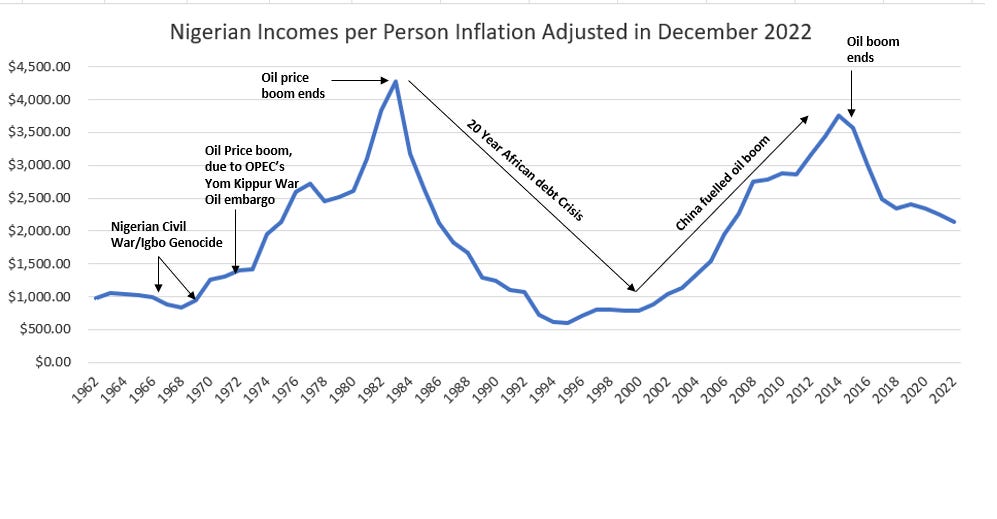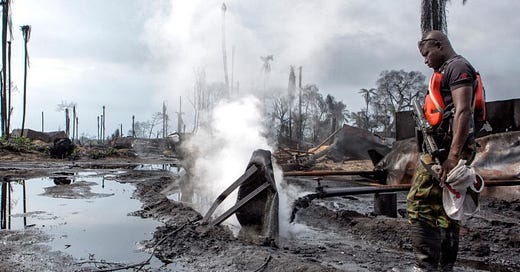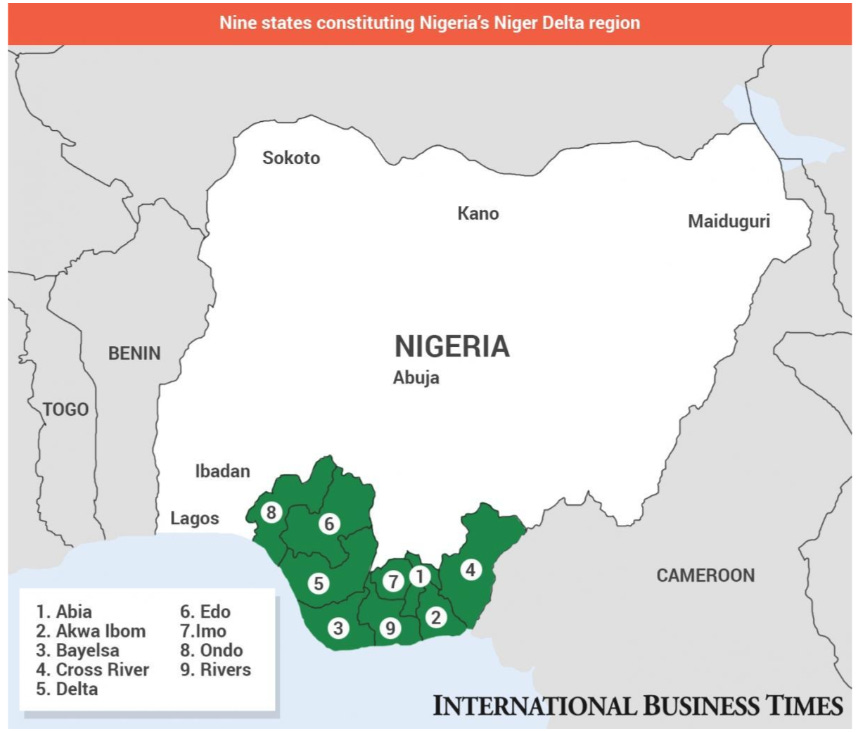“600,000 barrels of oil are stolen daily by the government and security officials, and even members of the clergy.” — Mele Kyari, head of Nigerian National Petroleum Company, the state owned oil firm of Nigeria
As of 2022, Nigeria is the 16th largest producer of crude oil and the second largest oil producer in Africa (usually Nigeria is #1, but Algeria beat Nigeria in 2022 due to oil theft killing Nigerian oil production).
There are many oil firms that operate in Nigeria like American Exxon & Chevron, Norwegian Equinor, British Shell, and Italy’s ENI. Oil contributes most of Nigeria’s government revenue, since Nigeria has a low tax collection rate, with taxes accounting for only 6% of its GDP, one of the lowest rates on earth.
Brief History
Since the colonial era, oil exploration has been ongoing in Nigeria. Shell, a British firm, drilled the first successful oil well in the Niger Delta region in 1956, four years before Nigeria’s independence.
As of 2021, over 72% of Nigeria’s international exports consist of crude oil. High oil prices have been kind to Nigeria from 1970-1981 back when oil prices were high, but when oil prices plummeted from 1981-2000, Nigeria declined, like most African countries did in the two decade African debt crisis. Many countries that Nigeria used to be richer than, surpassed it (i.e China). From 2000-2014, oil prices rose again thanks to global economic growth and an increasingly richer China that was hungry for crude oil. However, when America kickstarted the shale revolution (increasing production) and when Xi Jinping restructured China’s economy from export manufacturing to internal consumption, Chinese double digit growth fell (decreasing the rate of increase of global demand). Both these causes led to global supply of oil outstripping demand. Post 2014, oil prices dropped, and so has Nigeria’s economy and incomes. Nigeria has yet to recover from the 2014 peak. Peak Nigerian incomes, inflation adjusted, was in the early 1980s. A second slower peak was reached in 2014.

Despite Nigeria being a massive oil producer, Nigeria faces significant oil theft, hampering its export potential. In 2011, Nigeria produced 2.5M barrels of oil per day, in 2022, Nigeria was producing slightly under 1.5M barrels of oil per day, failing to meet it’s OPEC supply quota. The state oil company, National Nigerian Petroleum Company (NNPC) can’t meet its output targets. Mele Kyari, the head of the NNPC, says that 600K barrels of oil are stolen daily by smugglers, militants, the government, security officials, and the Church. In November 2023, oil prices, which averaged $80 per barrel, multiplied by 600K barrels per day stolen, equates to $48M of oil is stolen daily. That means $17.52B of oil is stolen in a year. If we extend this to 10 years, averaging at $80 per barrel, this is $175 billion stolen. Theft is so bad, that the Nigerian government has contracted TomPolo, a millionaire and former militant rebel group leader, of the Emancipation of the Niger Delta, to protect Nigeria’s pipelines.
Nigeria’s new president Bola Tinubu started off his presidency with an explosive start. He reduced the costly $10B fuel subsidy that drains the Nigerian treasury. Additionally, Tinubu is allowing the Nigerian naira to float, avoiding the need to use reserves to support its value and eliminate multiple exchange rates, including the black market rate. If implemented effectively, these changes could potentially be redirected towards improved public services in education and healthcare. The questions you might be asking is, why was the fuel subsidy fueling corruption? Why was it necessary to remove it? If not implemented correctly, your average Nigerian will scream.
Fuel Subsidy
A subsidy or government incentive is a government expenditure targeted towards households.
In the 1970s, after the Biafra war, Nigeria’s economy was booming thanks to rising oil prices from OPEC’s Embargo on the West for supporting Israel in the 1973 Yom Kippur war.
But unfortunately, rising oil prices, also hurt Nigerians, so the government decided to introduce a consumption fuel subsidy to provide cheap petrol for Nigerians.
Welfare for the Middle Class
Import Petrol: Nigeria is notoriously poor at refining petroleum. Although that might change with Dangote’s new refinery. So Nigeria imports $11.3B jet fuel, diesel, and gasoline from mainly the European Union, India, UK, Russia, and Malaysia.
Price Cap: The government then regulates the retail price of gasoline by setting a price cap, the cap was lower than the cost of production and importation. This subsidy was why Nigerians used to enjoy among the cheapest fuel in the world ($0.40 per litre).
Subsidy Payment: Using 2021, Nigeria imported $11.3B in refined petrol, which at market price at the time was $1 per gallon or $3.8 per litre. Yet, the fuel subsidy, gives Nigerians a lower cost at $0.40 per litre, this means that the Nigerian government is paying $3.4 per litre to international petroleum providers to make sure that the small proportion of Nigerian car drivers have cheap fuel. The price Nigeria paid for importing fuel in 2021 was 3x as much in 2020.
The consumption fuel subsidy was implemented to allow Nigerians to purchase petrol at cheap prices to ease the cost of buying petrol. As a result, the fuel subsidy is one of the most popular policies implemented in Nigeria among the voting middle class. However, the problem with petrol is that there are still many Nigerians who don’t have access to electricity, don’t drive bicycles, don’t take public transit, or drive cars at all. From Nigeria’s National Bureau of Statistics, only 6% of Nigerians drive a car or truck,. There’s only 12M vehicles in Nigeria. In affect, the fuel subsidy is the government using government revenues to supplement the consumption of middle class to upper class Nigerians who own cars. (It also subsidies businesses and public services that use transport fuel). $10B subsidy would be better spent on investment in a combination of new oil & gas facilities, infrastructure, roads, or education.
Whenever crude oil prices increased, the gap between the real and subsidized price became larger. This meant a larger bill for the government to subsidize fuel. It’s now becoming too much for the Nigerian government. In 2022, Nigeria spent 80% of its government revenue servicing debts. Spending $10B on fuel subsidies is no longer mathematically feasible, especially with Nigeria’s rising dollar denominate debts and a falling naira to dollar ratio. The generous fuel subsidy had to be reduced, despite the police being unpopular. But let’s talk about how the generous subsidy in the past fueled corruption.
Arbitrage or Fuel Smuggling?
When Nigerians paid $0.40 per liter, it was among the cheapest petrol prices in the world. But other African countries don’t subsidize their fuel prices as much as Nigeria. Ghana, another West African country, had fuel prices at $1.1 per liter. (Again, market price is closer to $3.8 at the time). If a thief made an illegal firm that could steal 1M liters of petrol from Nigeria, and smuggle petrol to Ghana, the thief would make ($1.1 - $0.4) per liter * 1M liter = $700K. Other places with higher petrol prices in Africa are: Tanzania at $1.31, South Africa: $1.36, Kenya at $1.45 and Zimbabwe at $1.65. Super generously subsided petrol in Nigeria, is easy money for thieves.
Stealing crude oil
”Hot Tapping”: To steal crude oil, thieves will drill holes into a high pressure oil pipeline in the Niger Delta. The thief will then install a value on the tap to control the flow of oil and steal it. After the thief collects the crude, they try to remove evidence of theft. Then, they refine the crude locally with their makeshift refining technology. Finally, the thief will put the refined product in containers/barrels and then sell it on the black market. If hot tapping is done incorrectly, it leads to oil spills and explosions.
“Cold Tapping”: Another way to steal oil, is for a thief to purposely blow up a pipeline. The pipeline is then shutdown and mechanics fix the pipeline. A thief will pretend to be a mechanic/bribe someone to get unauthorized access to the inactive pipeline and then they bring values to siphon crude oil. Then the thief will put the crude in containers/ tanks/storage vessels and try to remove evidence.
Steal from the export terminal: Some thieves will steal oil from tankers already loaded on export terminals. Either through colluding with administrators or taking advantage of inefficient security, thieves will still oil barrels at ports, load the barrels at criminal trucks, and sell the barrels to adjacent African countries like Cameroon, Togo, Benin, Ghana, or Ivory Coast, where they can sell crude oil at a much higher price.
Steal from the trucks: Thieves will steal from the terminal storage tanks on the trucks.
These smugglers take 100K to 400K barrels per day, sometimes to buyers as far as Latin America.
Stealing Petrol
Stealing Petrol: Middlemen would buy subsidized petrol in Nigeria and then smuggle the petrol outside the country to sell petrol at a higher cost/market prices to Benin, Ghana, or on the international market to China or India. This is called fuel smuggling or “bunkering”.
The smugglers use large vehicles, lorries, and tanker trucks to transport significant quantities of fuel. The smugglers modify their vehicles to allow hidden compartments where fuel can be stored. This allows them to transport more fuel than what would be visible to the surface. The smuggler then would falsify or manipulate shipping documents to make it appear as if fuel is being transported for legitimate purposes. Then smugglers have may choices for smuggling:
They may choose routes that are less likely to be patrolled or inspected by authorities.
They may use backroads, remote areas, cross borders in places where enforcement is limited
They might bribe or collude with the border guards or customers officers
They would go to coastal areas where they can use small boats/ships to transfer fuel to neighboring countries
They might take fuel from tapping into the pipelines to siphon off fuel directly.. This is really bad because it leads to environmental damage and explosion.
Nigeria technically has laws on the books to prevent fuel smuggling, but state capacity is weak in Nigeria, the oversight is weak and bureaucrats sometimes get paid bribes so that the smuggling can persist. The government needs to do a better job confiscating smuggle boats and arrest the thieves. But not nearly enough is happening.
For a country like Nigeria, this is unproductive investment.
The issue with reducing the subsidy is that now Nigerians have to pay the market price for fuel, causing high inflation. In addition, since Nigeria imports refined petrol from Europe, wheat from Russia & Ukraine, clothes and machines from China, and many other goods, with a weak naira to dollar exchange rate, purchasing these goods from abroad becomes more expensive.
Multinationals
Multinationals hate one form of oil theft, but also collude with other forms of oil theft. As much as multinationals might bribe politicians and buy illicitly gotten petrol or crude, oil firms still hate it when their investment in facilities in Nigeria don’t pay off due to theft.
Let’s break this down between oil theft multinational loves and hates.
Oil Theft Multinationals Hate:
Multinationals like British Shell or Italian ENI complain about oil theft in the Niger Delta. The thieves damage pipelines which can cause leaks and lead to environmental fines. When thieves damaged Shell’s pipeline in 2011, oil spilled which damaged the drinking water in Ogoniland. Shell doled out a billion to clean up the project with the NNPC, but it has been mired in mismanagement.
There also was a time when the Trans-Niger and Nembe Creek pipelines were shutdown for repairs due to the sabotage by bunkerers.
This theft has forced many major oil firms like American Exxon & Chevon, Eni of Italy, British Shell, and Total of France to shut some of their wells.
If the math of a project isn’t leading to profits due to vandalism, then firms will divest which severely constrains Nigeria’s production. Many export terminals in Nigeria have been disrupted.
Shell declared force majeure (A firm cannot fulfill a contract due to unforeseeable circumstances) just after one year in 2022, when exports of high-quality Bonny Light crude prevented due to pipeline attacks.
In 2022, China’s Addax handed its four oil blocs to NNPC. Exxon Mobil is trying to divested $1.3B from four oil fields to a local Nigerian firm, Seplat Energy.
Since 2011, Oil Majors are tired. Net inflows, in foreign direct investment has fell from nearly $9B in 2011 to -$190M in 2022 (negative net inflow means companies are divesting). Historically, most FDI in Nigeria was in oil & gas.
Oil Theft Multinationals Love:
Who do you think is buying the stolen crude oil and storing it? There’s a lot of illegal crude that ends up in West Africa, America, China, Singapore, and Europe. Which firms do you think buy it? It’s oil traders like Trafalgar and Glencore. The oil sales are laundered through banks in many Swiss Banks, which are notorious for bank secrecy.
Militants
The Nigerians that live near the Niger Delta region hate it when oil destroys their water. In the 1990s, there was a non-violent group called Movement for the Survival of the Ogoni People (Mosop) which protested against environmental degradation. The government brutally beat that group an executed many of their leaders in the 90s.
In addition, the people who live in the Niger Delta feel like the government is not allocating enough money for development in their region despite that fact that the Niger Delta is the biggest contributor to Nigeria’s government revenue. That’s what created the militant groups — Movement for the Emancipation of the Niger Delta & The Niger Delta Avengers. As a result, these militants occasionally kidnap oil workers and execute pipeline bomb attacks. In June 2023, eight employees of MRS Oil Nigeria have been kidnapped. The militants usually exchange the abducted people for huge ransoms. These groups have hampered Nigerian oil production.
Government Ministers
Government officials are in on this too. In 2023, Diezani Alison-Madueke, Nigeria’s oil minister from 2010-2015, was charged of bribery by the British government for taking kickbacks after awarding multi-million dollar oil & gas contracts. Madueke has received at least $100K in cash, chauffer-driven cars, private jet flights, all expense paid holiday vacations, and properties in the city of London. She also received furniture, renovation work, staff for the London properties, luxury gifts from Cartier and Louis Vitton, and private school fee payments for her kids. After she left office, she was living in London.
The US and UK have recovered $53M in assets linked to her criminality.
Conclusion
Truth is we have only begun to discuss the issues of corruption in Nigeria. But we have started off this discussing talking about the fuel subsidy arbitrage, bribery of government officials, militants in the Niger-Delta, and oil traders like Trafalgar who buy illicitly gotten oil.
In reality, the generous Nigerian fuel subsidy was a textbook market distortion leading to rent seeking behavior and moral hazards. Only 6% of the populace drives a car, which means the subsidy benefits the few. (Although it also benefits people who use public transport and motorcyclists). Any smuggler, could steal crude then refine it or smuggle petrol at the low subsidized price in Nigeria and then sell it abroad at a higher price.
There are other issues of bribing government officials, port security, and oil thieves selling crude to oil traders who stash their illicit funds in Swiss Banks.
The security problems have led to oil majors divesting from Nigeria and increasing their fossil fuel projects in other oil & gas nations in Africa.
It was prudent that Bola reduced the subsidy. But the question is… Will that money be better invested in , basic welfare, or other industries? Only time will tell.











Great piece, thank you very much. I was always shocked that so much oil could be stolen - it's never a good that I'd associate with easy/large scale theft. Guess that goes to show how poor enforcement/how significant corruption is, as you've noted.